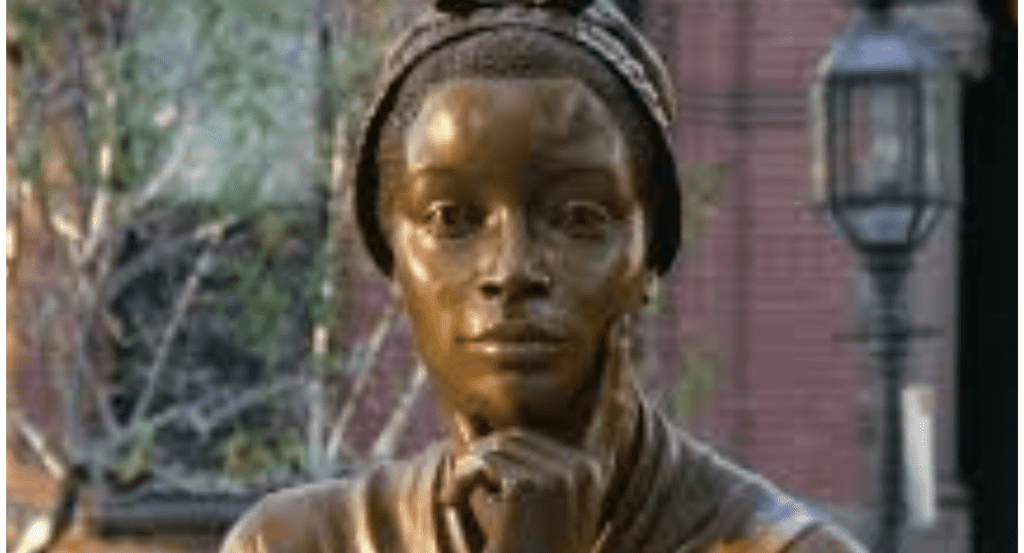Phillis Wheatley: A Pioneer in Black Literature and Poetry
Phillis Wheatley was a groundbreaking poet who became the first African American to publish a book of poetry. Kidnapped from West Africa as a child and sold into slavery, she defied systemic oppression and proved Black intellectual excellence. Despite skepticism from powerful figures like Thomas Jefferson, she left an enduring mark on literature and activism.
Phillis Wheatley’s Early Life and Literary Awakening
Born in 1753 in what is now Senegal and Gambia, Phillis Wheatley was taken from her homeland and brought to Boston on a slave ship named Phillis. The wealthy Wheatley family purchased her and provided an education rarely given to enslaved individuals.
She quickly mastered English and studied classical literature, the Bible, and Latin poetry. By the age of 12, she was writing poetry, and by 13, she had her first poem published. Her exceptional talent caught the attention of literary circles, but many doubted that an enslaved African could produce such refined work.
Phillis Wheatley’s Journey to Literary Fame
Phillis Wheatley gained recognition when her poem On Messrs Hussey and Coffin appeared in the Newport Mercury in 1767. She continued writing poetry on themes of faith, morality, and oppression, using classical forms that appealed to white audiences.
Skeptics challenged her authorship, leading to a tribunal of 18 influential men, including John Hancock, who examined her abilities. After rigorous questioning, they confirmed that she had indeed written the poetry. Their signed attestation became the preface to her first book, validating her genius.
DON’T MISS THIS: Ibrahim Babangida’s Book Unveils Hidden Truths About Nigeria’s Past
Phillis Wheatley’s Groundbreaking Book and Global Recognition
Struggling to find an American publisher for her poetry, Phillis Wheatley and the Wheatley family turned to London. With the support of abolitionists, she secured a publisher, and in 1773, Poems on Various Subjects, Religious and Moral was released.
This historic publication made her the first African American to publish a book of poetry. Her work reached global audiences, receiving praise from scholars, abolitionists, and political leaders. Even George Washington admired her poetry, responding to her in 1776 after she dedicated a poem to him.
Abolitionists used her success to counter arguments of Black inferiority, proving that African Americans possessed the same intellectual capabilities as their white counterparts.
Phillis Wheatley’s Legacy in Black Literature and Activism
Phillis Wheatley laid the foundation for future Black writers, activists, and poets. Her ability to use literature as a form of resistance set a precedent for figures like Frederick Douglass and Olaudah Equiano, who later wrote about racial injustice.
Her influence extended to movements like the Harlem Renaissance, inspiring writers such as Langston Hughes and Zora Neale Hurston. Her work demonstrated that poetry could challenge oppression and advocate for freedom, dignity, and equality.
Challenges and the Final Years of Phillis Wheatley
Despite her literary achievements, Phillis Wheatley faced hardships after gaining freedom in 1774. She married John Peters, a free Black man, but financial struggles plagued their lives. She was unable to find a publisher for her second poetry collection and lived in poverty.
Tragically, she died at the age of 31 in 1784, leaving behind an unfinished legacy.
The Lasting Impact of Phillis Wheatley
Phillis Wheatley’s contributions to literature and activism remain significant today. Her pioneering work proved that Black voices not only belonged in literature but could also shape cultural and political discourse.
Her poetry continues to inspire generations, proving that even in the face of oppression, creativity and resilience can thrive.
By breaking barriers and redefining possibilities for Black writers, Phillis Wheatley ensured that her legacy would endure for centuries to come.




















